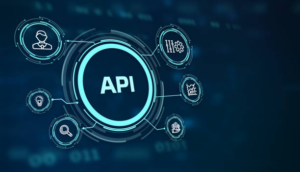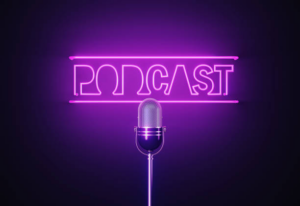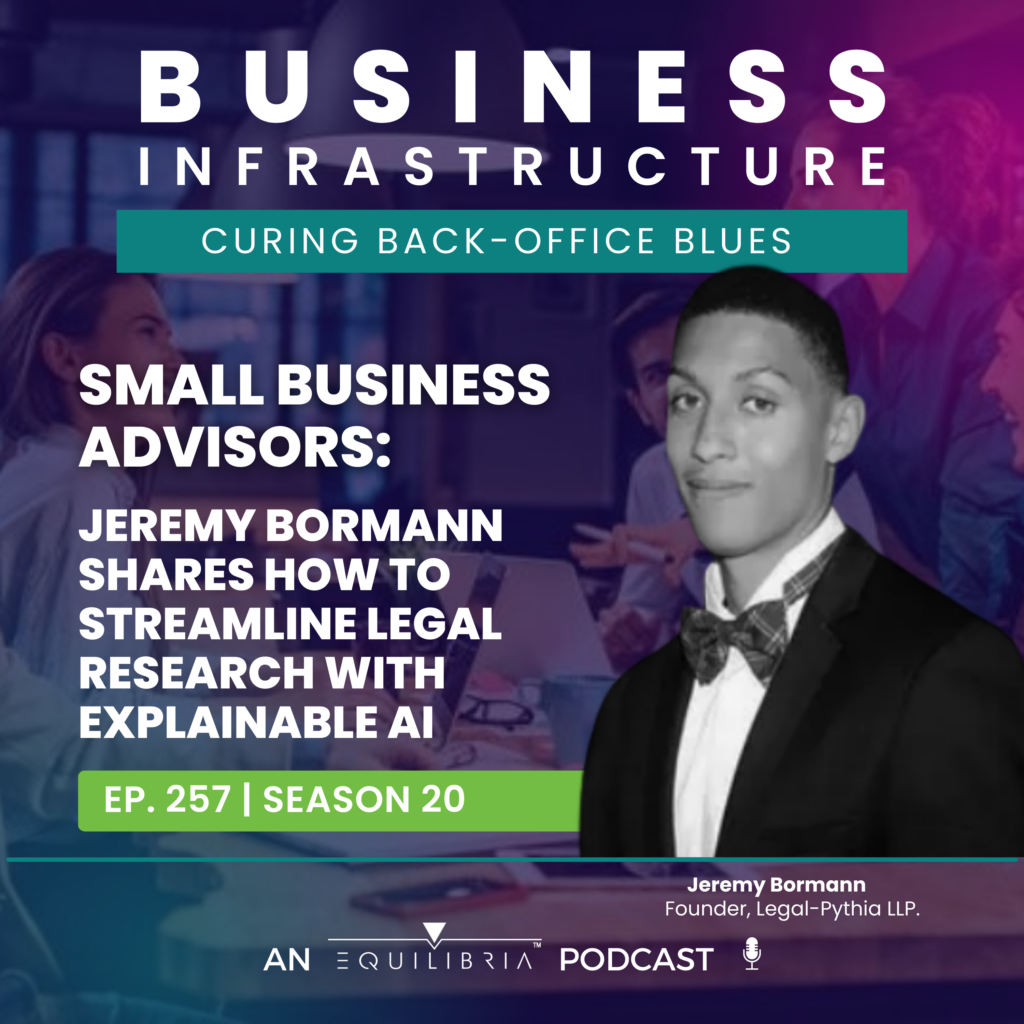Transcript
AI is all the rage now and while some people fear it will take over their jobs others are eagerly figuring out how it can streamline their operations. Which category do you fall in?
This episode is underwritten by Equilibria, Inc. the company behind this podcast where we design scale-ready business infrastructure for fast-growing small businesses.

This is Season 20 on the Business Infrastructure podcast – the show where we share operational tips, strategies, and tactics to help you cure any back-office blues you might be experiencing. I’m Alicia Butler Pierre and this season features 12 small business advisors, each with a unique skillset they’ll share with you.
If you aren’t a believer in the power of AI to radically transform some of your back-office operations, then you may change your mind after listening to our featured advisor in this episode. He’s young, smart, and hella ambitious. And…he’s taken the challenge to automate research in the legal industry with his explainable AI technology.

This is Episode 257– Jeremy Bormann Shares How to Streamline Legal Research with Explainable AI.
My name is Jeremy Bormann. I’m 28 years old. I’m half German, half American. I used to be a law student in Germany and in the United Kingdom. I’m the founder of a company called Legal Pythia. We use explainable artificial intelligence that organizes information for lawyers and insurance companies in the whole world. I’m also the founder of a podcast, which is called Buision, which is basically to empower people to do business, learn from each other, and solve problems together. It’s really a pleasure to be here, to talk with you.
Have your ears already perked up? Jeremy has an interesting background in law and technology. And considering the fast pace of technology, it’s difficult for laws and legislation to keep up. It makes you wonder, how did Jeremy cleverly combine these two areas that seem to be diametrically opposed?
I think I will start by saying because of my German-American nature, I moved around a lot in the world and, my dad used to be a pilot for the Air Force but he decided to pursue computer science in the United States. He worked for IBM in California in San Francisco. And then he also pursued his Ph.D. in computer science as well. He was also a programmer for NATO. Every time I was at his house, I saw him programming or doing things like that. I kind of got inspired by that. I loved reading ever since I was a child.

Different kinds of books, you know, your typical books also in school, like Shakespeare, Frankenstein, Beowulf, these types of things. I always was good in English, I was in the AP courses in my high school. So, I decided that I wanted to study literature, actually, not in the US but in Germany because the US was too expensive for me. I didn’t really have that money, but I had good grades.
And those good grades helped Jeremy secure a spot in what he described as the highest form of high school in Germany. Although he found a passion in literature, peer pressure led to a harsh reality check regarding a future career in that field.
Literature doesn’t really make a lot of money, you know, after you graduate you got to be realistic. And then for me, I was like, okay, what is the closest thing to that?
And then I saw law and I was like, okay, I’m going to study law. I never really wanted to be a lawyer, to be honest, because I don’t really like desk jobs. And they always seemed kind of boring to me. I studied law, I had good grades. I had a chance to go for a year to Scotland. I studied corporate and financial law at the University of Glasgow. I had my master’s. I was about to come back and finish my studies in Germany when I met a really good friend from Kenya. And he kind of inspired me to do business in the startup.
So, you haven’t actually practiced as a lawyer, is that correct?

No, I haven’t. I had a couple of internships at like big law firms. I liked the work. I just didn’t really like the work environment. There was like a lot of pressure, toxic behavior, and stuff like that. The money was good, but for me, it just wasn’t the thing I wanted to do with, my career.
So, Jeremy decided to not pursue a career in something he loved – literature and instead studied law – something he did not love. The year was 2020 and the world was changing. There was a push toward more remote work and digitization as a result of the coronavirus pandemic. When he met his friend from Kenya, he found a kindred spirit. So like any entrepreneur, he decided to combine all his talents into providing a solution to a problem he saw during his brief time working around lawyers.
I had really the option already started Legal Pythia back then. It was like, should I become a lawyer, do a classical career or should I do like a business then a year before I also met Augustine Kiama from Kenya.
I always knew him, but we weren’t really close friends like that. But you know, especially if you’re a person of color, if you’re black, you connect with other black people a little bit easier, I guess, especially in Europe. We just got into discussing things. He also has a podcast. he has a marketing agency so, it was kind of inspiring and interesting to see. I kind of thought to myself, I like what he’s doing for his life. Being an entrepreneur, it sounds like fun. later turned out it was, probably harder than ever.
Yeah. But he kind of inspired me to do it but then he left because he was doing his own thing. He moved back to Kenya and I started Legal Pythia here a year later. I actually started in the United Kingdom in Glasgow cause it was really cheap. It was like 25 pounds. In Germany, it would cost like 300 euros to start a company. Yeah, I was a student. I was basically broke.
So, remember how I mentioned Jeremy’s brief stint working in the legal field and how that was part of his inspiration in starting his business? I asked him to talk a little more about those experiences.
I was an intern at Linklaters, LLP basically a global leading law firm. they’re based out of London, but they had an office near my university. So, I was guaranteed an internship before I went to Glasgow. And I was actually really excited because big law firms, not everybody had the chance to go there. In my mind, it was kind of like big suits, big offices, and things like that.
I think I was the only person of color in that whole building even. I didn’t really have an issue with that I was in the data protection technology and patent software team. Big companies get a lot of customer data and then they have to check if that’s viable or you know, if a bank buys another bank, what happens to the customer data? The cases were really interesting. So, it was really fun to work there but the work environment was not really that fun. There was like a lot of yelling within that team there were also a lot of fights.

I saw my mentor just struggling with having to manually look at information, having to manually look at data, and having to like to search through that data. They were like big paper stacks. And she, she gave that to us, the interns, good luck, you know, type of thing., we had to compare like huge data sets from state officials and all that type of stuff. That was, really unnecessary.
Unnecessary, but a pivotal moment for Jeremy.
I thought to myself, Okay, how can we kind of solve this problem? How can I make a profit maybe by giving out a solution? Yeah. So, I thought of Legal Pythia as an AI tool that could help with that. at the time my dad already had started a tech company, and he was fairly successful and I was like, okay, why not just try to do it? And that’s how it basically started.
There’s an expression that says necessity is the mother of invention. Doing all of that manual work at a law firm inspired Jeremy to pair his legal knowledge with technology. So, what exactly is Legal Pythia and how does AI work to automate the work Jeremy described? Is it like Chat GPT? Jeremy will explain this and more after this commercial break.
How do you know if your business is growing faster than you can keep up with? If you have trouble keeping up with things like deliveries and projects. Your customers are angry, team turnover is high, and the complaints are piling up. Where can you go for relief? How can you save your business from the chaos of unmanageable, fast growth?
It might be time to build business infrastructure. Business infrastructure is a system for linking the people, processes, tools, and technologies that act as the heartbeat of your back-office operations. It gives your fast-growing small business a stable foundation to not only continue growing but to scale in a profitable, sustainable, and repeatable way.
That’s why if you want a business that can consistently operate without your daily presence, then the Smooth Operator course is for you. It’s an online introductory course on business infrastructure that can provide you with proven tools, tactics, and techniques to calm the chaos and restore order. Go to SmoothOperator.courses to learn more. That’s SmoothOperator.courses.
We’re back and before the break, we learned the backstory that led Jeremy Bormann to leave behind a future career working as a lawyer to start Legal Pythia, a tech startup that uses AI to streamline research for lawyers. Now before you start thinking this doesn’t apply to you, give him a chance to explain because his technology can be used by any of us who manage large sets of digital documents in our back-office operations. Here’s Jeremy….

First I want to say, the US and China, they’re always ahead with tech, it’s kinda sometimes annoying if you want to innovate and then, you don’t have the millions behind it. I would say it’s fairly different than Chat GPT because we do more data analysis. So, our software analyzes text documents, but also customer data numbers. And where we’re maybe similar to Chat GPT is that we give explanations, but we don’t give explanations to questions. So Legal Pythia doesn’t work in, you type in a certain legal question. The software kind of, you know, does the database kind of thing, AI kind of thing.
And then it spits out an answer that like a human or lawyer or somebody that took the bar exam could give to you, we have a huge data set where we have like 50 documents, compare these data sets, where are the similarities? Where are the differences? Where can I see it through? Where can I not see it through? Why are these laws the same? Why are they different? And then the software kind of explains to you, Okay, this is the solution. this is how the software came to the solution because you know, you don’t really know how Chat GPT came to its solution.
And this is a key distinction when comparing Legal Pythia to Chat GPT. Legal Pythia is known as Explainable AI or XAI. Chat GPT is known as generative AI. Explainable AI offers transparent explanations and reasons for decisions that computers make.
This software actually explains to you what type of steps led to that decision. Explainable AI also tries to like to eradicate bias. If you think about a system that is used in the U.S., and if there’s like a lot of data fit into it by, let’s say maybe African-American sport or even the Mexican or Hispanic community, the AI is going to tend to be, probably a little bit racist.
Cause you to know, if you feed it like a hundred, 500 data sets with like, okay, black people have been criminals in these types of cases is going to think like a certain type of way. And that’s also where we are trying to kind of also like to eradicate that it doesn’t matter what type of data you feed it, it’s more unbiased.
It sounds interesting – this idea of an unbiased AI tool. So, who exactly are ideal customers for Legal Pythia?
Our main companies are smaller to medium-sized businesses. could also be government entities, you know, city councils, administrative services, and definitely lawyers. so we’re trying to partner with lawyers. We worked with a Scottish Energy company before and did a pilot, data comparison. so those types of, companies, SMEs, and medium-sized businesses have a lot of legal contracts. It’s more our target customers at the moment.
And to clarify, Legal Pythia isn’t just for small and medium-sized companies in Europe.
Yeah, most definitely. The software works in English, and it also works in German at the moment so, we’re trying to also make it with different languages as well.
That’s awesome! Okay. So, Jeremy, let’s say I am a lawyer, and I have a small practice, and I don’t have the benefit unfortunately of having a paralegal who can sort through these mounds and mounds of paperwork. But there are some things that I need to do to prepare for a case. I find out about Legal Pythia. Can you walk us through the process from a business infrastructure perspective?
And for those who are watching us or listening to us for the first time, business infrastructure is simply a system for how you link your people, your processes, and your technologies. How do you link all of those things together so that scale can happen in a repeatable, profitable, and sustainable way?

So, the first thing you will do you will get either a document from your client or you have, a bunch of paper stacks. at the moment you would still have to scan them, but you have Adobe Scan or Adobe Read and can do that via your phone. And then let’s say you get two documents, and you want to compare them, you either upload both documents on Legal Pythia, or you log in, it’s going to be a normal login page. you can log in with Google, with a Microsoft account, or your own personal account.
You can then upload a minimum of two documents. We’re working on more documents as well. You can then also as, as a second option only upload one document. And what we’re doing at the moment is creating a database of old documents and old cases that you compare your kind of new document to.
So let’s say you get a new document as well, and there have been cases in the past or laws in the past that kind of curate to that, you can compare that to them as well. so that’s also an option. but let’s say you have two documents, you want to compare them. You upload both of them up to Legal Pythia, they can be pdf, they can be Word, they can be Excel files, they can be text files as well.
Once you’ve done that, you have multiple options. The first one is just like a general similarity view, meaning it just gives you a pie chart, a quick overview of how similar these documents are. Green things are similar. And then the red percentages are, I would say contradictions.

So it’s going to look like a circle, and then it’s probably going to have like 75%, similar, 25%, contradictory. If it’s a hundred percent, it’s probably unlikely that you will have to do more searches once you have that, you can do a sentence-to-sentence comparison, Which means the software’s going to take these sentences from document one. Gonna take the sentences from document two. It’s going to compare both, and it’ll give you the percentages of how similar they are and how, different they are and it’s also going to give you the percentages of the sentence comparison as well.
You might be wondering why this level of detailed comparison matters. Listen as Jeremy explains.
This going to make reading through these huge documents, much easier. You’re going to have it automated and then you have like an Excel file sheet of all these sentences from that document, so you can exactly see, okay, on row eight, these two sentences, these two documents are not the same because of this and this reason. And the difference might be, you know, just like 5%, but also might be 90%. A basic keyword search means you can upload two documents or one document again as well. You put in a certain keyword.
Let’s say I have a document of like 50 pages, but I want to find, a kind of legal action or just the word, “attorney,” in that document. You know, it’s going to take me like hours to find it. But if I put in certain keywords, what this software’s going to do is going to highlight every similar word.
So if I put in “attorney,” it’s going to highlight law firm, it’s going to highlight court, it’s going to highlight judicial system in that kind of document that I upload with a color, let’s say blue. And then I can already see, okay, I only have to look at pages five and six instead of, you know, looking through that. you might now argue, okay, the word can do the same.
And that is a fair point. MS Word can do the same thing. As a user, you use the Find function to scan a document for a particular word or phrase and it will generate results if it finds that word or phrase. So what makes Jeremy’s software different in this instance?
What makes our software different is you can make it with like multiple keywords and then you have different colors highlighted. Let’s say put it in three or five keywords, you’re going to have the document analyzed and shown in five, or six different colors, right? Meaning you can kind of structure your document and only look at the kind of text passages that you need instead of also typing in the Word document and looking for that word over and over again. the last thing that we have also is kind of a data comparison.
It’s more, it’s less, legal things, but, let’s say you have a big customer list, and that gets updated because your customers send in new lists every day or new information. And instead of having somebody in the background of your company or even your secretary paralegal up these updates, it’s going to put in the new information and compare it to that data list.

It’s going to show you the duplicates. So, let’s say you have a customer, five years ago, he lived in Florida, but now he moved to California. He puts it in as a new piece of information. The software’s going to update that. It’s going to take Florida out of the old list. It’s going to put California on a new list. And it’s just going to update that list as well. If you want to keep that customer information because that might be relevant at a later point. you can just click on that row and then it will automatically save that as well. You can download that via Excel and then share that with colleagues and clients as well.
All these features are curated with Explainable AI, basically meaning that the software kind of tells you what happened, what kind of keywords led to the decisions, where was the comparison made, and things like that. So that gives you more transparency. You can then go to your client as a lawyer and say, “Hey, we decided not to move on with your case because of this and this reason. These passages led us to believe that, you’re not eligible,” or, or something like that.
And here’s another point to make – you can use Legal Pythia for your business too. You don’t have to be a lawyer dealing with legal documents to use it.
Most definitely. It doesn’t even have to be legal information.
I’m glad you mentioned that. It could technically be used as a document repository. You also talked quite a bit about making comparisons. I’m not a lawyer. but what would be the purpose of comparing two different documents against each other?

Yeah, you don’t even have to be a lawyer. Let’s say you’re a business owner like yourself let’s say you just got a legal notice, maybe you didn’t pay your tax on time, you get a document from the IRS and you ask yourself, Hey, maybe this is not legal or what’s kind of the standard in the industry? So, you upload that document to Legal Pythia, then we access our database, and then it kind of compares old cases, old templates, and it’ll show you, okay, here’s where the IRS messed up, and maybe in the future also this and this reason. So, you can again, go to the IRS and say, “Hey, this document is wrong. You sent me the wrong letter, I’m not liable for this, or I already paid my taxes.”
If you have a copy of your tax payment that you sent in, you can also maybe anonymize that, and put that into the Legal Pythia database. And then, you know, if people come back later and say, hey, you haven’t paid your taxes, you can say, “That’s wrong. I paid them 2000” and whatever, eight or “I paid them at three months ago.” The Legal Pythia shows that as well. So there’s like different kinds of options that you can do.
And so when you create an account, is the technology only storing or retrieving information from whatever you personally upload or scan into the system, or is it looking at, a total body of knowledge from all users?
it’s both. It’s even more than it.
I’m starting to think of security. You might not want information being put out there in the general body of knowledge.
I totally get it. That’s why we encrypt the data and make sure it’s safe. Any data that’s uploaded and only a certain amount of people have access to it. But it could be your own personal data, even anonymized, it doesn’t have to be your address or something like that. It could also be just data that’s out there.
You know, the Harvard Law School has a project called Harvard Case Law. They have 50,000 cases online. You can access them through an API and, so basically a communication channel. So, it could be public data or decisions by the Supreme Court, things like that as well. It doesn’t have to be personalized data.

Speaking of scanning, uploading, and comparing documents, it begs the question – aside from Legal Pythia, what resources does Jeremy recommend for streamlining certain back-office operations?
Yeah. I don’t want to blow up the competition, but Chat GPT is really, I can’t lie. It’s good. I even use Chat GPT on a daily basis, have the question like, how can I grow my business? What programs are there? But I, I also say, you know, just explore the internet. There’s lots of potential on the internet. there’s more than just Chat GPT as an AI. There are certain pages from AI that can create blogs automatically for you, that can edit your podcast. I think you just got to research as a business owner. I would also say it’s like 80% work, 20% new research work. for any smaller business owner,
Try to get yourself online, try to do podcasts, and get your name out there. It’s not enough that you have the best small insurance company in Kansas it used to be that like 50 years ago. But now people have so many business options. You have to stick out and you have to use everything you can, to become more competitive. I would also say, to check out a podcast that I have. It’s called The Busion Podcast. So that’s B U I S I O N. It’s a word from business and vision.

We talk about all types of things. We talk about like business involvement, you were there as well as a guest. Talking about business infrastructure, growing as an entrepreneur, growing as an entrepreneur from a minority background. also having new tips. We discuss is it worth starting a YouTube channel. We discuss politics, we get just different ideas. We have an open mind. check that out. It’s on Spotify.
Jeremy, thank you for coming to the show. I’m glad we were able to work this out considering our time zone differences.
Yeah, most definitely. Thank you so much. And I also want to wish you the best with their podcast and your business as well.
Thank you, Jeremy! I appreciate that.
Ah, I just love the energy and enthusiasm of young entrepreneurs like Jeremy and we here at Equilibria and the Business Infrastructure podcast also wish him nothing but the best. We expect big, revolutionary things to come from you, Jeremy! If you want to connect with Jeremy, keep up with his progress on Legal Pythia, or if you want to be a guest on his Buision podcast, then check out his website. It’s PythiaLegal.com. We’ll have a link to this as well as the other resources he mentioned in the show notes, including articles that describe both explainable and generative AI. Click on the description wherever you’re listening to this podcast and you’ll see the link there. Or, you can go directly to BusinessInfrastructure.TV. Again, that’s BusinessInfrastructure.TV.

Thank you for listening! Don’t forget to subscribe and leave a five-star rating and review.
Coming up in the next episode, you’ll hear from another specialist. This small business advisor works specifically with speech therapists but I promise you there’s so much for you to learn from her about scaling to a 6 or 7-figure business.
As you continue navigating the operational challenges of managing a fast-growing small business, just remember to stay focused and be encouraged. This entrepreneurial journey is a marathon and not a sprint. Don’t grow alone! We’re here to support you so don’t hesitate to reach out to us.
This podcast was written, produced, and narrated by me, Alicia Butler Pierre. Audio editing by Olanrewaju Adeyemo. The original score and sound design by Sabor! Music Enterprises.
This is the Business Infrastructure – Curing Back-Office Blues podcast.























